New Delhi, Feb 18: On Tuesday, Union Housing and Urban Affairs Minister Manohar Lal emphasized the importance of transitioning from conventional thermal energy to renewable sources, utilizing solar rooftop technology, and incorporating regenerative braking systems in metro operations as part of a move toward a more sustainable future.
The 5th International Conference on Green Metro Systems – The Future of Urban Mobility was inaugurated by the CII Indian Green Building Council (CII IGBC) in partnership with the Delhi Metro Rail Corporation (DMRC).
During his address, the minister noted, “As humanity advances, our progress can often come into conflict with nature, resulting in both innovation and challenges. The increase in global temperatures surpassing 1.5°C has raised worldwide alarms, leading nations to join forces under agreements like the Paris Accord.” He highlighted India’s pledge to achieve net-zero emissions by 2070, aligning economic growth with sustainable practices. Although urbanization and industrialization have escalated pollution levels, initiatives like the Delhi Metro have notably diminished environmental impact, illustrating that strategic infrastructure can facilitate development while safeguarding nature, he added.
Energy efficiency and clean power are critical in today’s context. The minister reasserted that the shift to renewable energy, solar rooftops, and regenerative braking supports the move toward sustainability.
Innovations such as vertical solar panels and energy-efficient LED lighting contribute significantly to sustainable urban living. Moreover, practicing responsible usage, from air conditioning to minimizing waste, can greatly influence energy conservation efforts, he remarked.
He further commented on the vital role of the metro in relieving congestion and pollution in the capital: “The inception of the metro in Delhi has revolutionized urban mobility. Without it, the city couldn’t have developed such an efficient transportation system. Approximately 7 million passengers utilize the metro daily.”
The minister pointed out that the future of industrial growth heavily relies on energy.
He mentioned that traditional power generation methods contribute to pollution, with thermal energy being a primary culprit, followed by hydro sources. The reliance on thermal energy compounds pollution and exacerbates global warming.
He applauded the Delhi Metro’s efforts in harnessing renewable energy through solar and wind, stating, “It’s commendable that we aim for our metro’s energy requirements to come entirely from renewable sources. This ensures we steer clear of fossil fuels and make a significant contribution to sustainability.”
According to a statement, Indian metro rail systems are playing a crucial role in the green building movement by delivering energy-efficient and low-emission public transport solutions, which in turn help reduce urban pollution and traffic congestion.
Across India, numerous metro stations are incorporating energy-saving technologies and solar power systems to decrease energy consumption. The DMRC leads in integrating solar energy to meet a substantial part of its operational needs.
Other cities such as Bengaluru, Hyderabad, Jaipur, Kochi, Lucknow, Mumbai, Nagpur, and Pune have also achieved IGBC certification for their dedication to sustainable design and environmentally friendly materials.
The conference also marked the launch of India’s first vertical bifacial solar plant on a metro viaduct and a 1MW rooftop solar facility at the Khyber Pass depot. Bifacial panels, capable of harnessing sunlight from both sides, will utilize the metro’s elevated structures for solar generation without requiring additional land, representing a significant milestone in sustainable metro operations and renewable energy contributions.
The CII Indian Green Building Council’s Green MRTS Rating System offers a holistic framework for assessing the sustainability performance of metro systems in India, covering aspects such as energy and water management, resource use, renewable energy integration, and enhancing commuter experiences. (PTI)


Leave a Reply